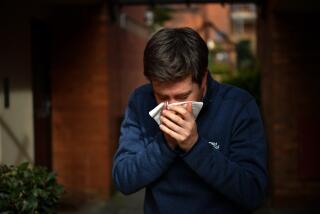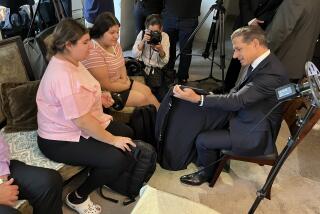A Primer on Avoiding Sick Days
- Share via
As every parent knows, going back to school can be hazardous to your child’s health. Along with smiling teachers, new books and shiny desktops, the classroom holds the potential for catching any number of colds, flus and intestinal upsets.
Elementary school students can expect to contract about half a dozen minor illnesses between September and June. Older students going off to college for the first time also face health hazards such as weight gain and psychological stress.
Experts say there are some simple ways to reduce the back-to-school risks to health, whatever a student’s age.
For young students, improving personal hygiene habits can dramatically reduce the number of sick days, said Dr. Harris Stutman, director of pediatric infectious disease at Memorial Miller Children’s Hospital, Long Beach.
Hand-washing is the most vital habit, he said, because “most germs are spread hand-to-hand.” Encourage a child to wash his hands, particularly after he blows his nose or uses the toilet, Stutman said.
Good nasal hygiene can help, too. “Teach kids to blow their noses when needed instead of sniffling,” Stutman suggested. Blowing reduces the chances that a cold will develop into sinus or ear infections.
To stay healthy on campus, college students should look for easy-to-follow ways of easing stress, said Dr. Carol Otis, adjunct assistant professor at the UCLA Student Health Center and co-author, with Roger Goldingay, of the “Campus Health Guide” (1989, The College Board, $14.95). The answer may be as simple as a daily 20-minute exercise break.
To avoid putting on extra pounds--what some physicians call “the freshman 15”--students should avoid fast foods and fatty foods, Otis said. “(But) it takes a lot of effort, especially when you’re eating cafeteria-style.”
It is also essential to have an up-to-date immunization record, Otis said. Before school starts, kindergartners should have received these vaccinations: measles, mumps and rubella, polio, and DPT, according to Sharon Wanglin of the Los Angeles County Department of Health Services. Young adults may need booster shots for measles or tetanus, physicians say.
Otis recommends that new college students check out campus health-care facilities before they need them, especially if they suffer from a chronic medical problem such as asthma.
It also may be prudent to investigate requirements for using health plans on campus, Otis said. “Some health maintenance organizations, for instance, need to see a membership card (before rendering medical services).” Low-cost health insurance may be available through the school, she said.
“Once at school, a college student’s greatest risk is from accidents or sexually transmitted diseases,” Otis added. “Students should follow two simple rules to minimize those risks--drive sober and use condoms.”
POINT / COUNTERPOINT
Breast Reconstruction Surgery: Now or Later?
In recent years it has become increasingly common to reconstruct the breast after a mastectomy for cancer. Women who have the procedure often say reconstruction gives them a sense of wholeness and helps reduce psychological trauma. Under debate by doctors: the best time to perform reconstruction. Some operate immediately after the mastectomy whenever possible, reasoning that it is less psychologically traumatic. Others postpone the reconstruction, arguing that the additional surgery might promote the spread of cancer or interfere with future treatment. It’s not a black-and-white issue, but here are two experts’ views on the options.
Dr. W. Grant Stevens, Marina del Rey plastic and reconstructive surgeon; associate director of the Breast Center at Daniel Freeman Marina Hospital:
“There are some valid reasons for postponing breast reconstruction, especially in the elderly or in patients whose cancer has spread and need chemotherapy. But most women benefit greatly from immediate breast reconstruction after mastectomy. For those who are candidates, immediate reconstruction gives peace of mind and a sense of wholeness. They have fewer hospitalizations and surgeries and are never totally without a breast. That results in a big psychological boost. Studies show that women who have immediate reconstruction have improved interpersonal relationships with family members and spouses and better psychological adjustments to their surgery and their cancer.”
Dr. Anne Miller, plastic and reconstructive surgeon, Columbus, Ohio, researcher:
“Yes, immediate reconstruction can give women psychological benefit and is advisable in a large number of patients. But there are some patients who have a higher risk of complications, such as infection, which can lead to the need to remove the breast implant. Risk factors for complications include obesity, age over 60, cigarette-smoking, diabetes and, to a lesser extent, high blood pressure. In my study of more than 100 breast reconstructions, patients who had many of these risk factors were more likely to have complications, such as infection, if they had immediate reconstruction. That was not true for those who had delayed reconstruction. If women have two or more of these risk factors, perhaps they should consider delayed breast reconstruction. There will always be exceptions, and the final decision needs to be individualized.”
SHOPTALK Kits Help Consumers Get Lead Out
The lead that leaches from paint, ceramic dinnerware and other household items can be dangerous if ingested or inhaled. To combat the threat, federal laws have been tightened to restrict the amount of lead in such items. Now consumers can also test for lead content at home with mail-order kits that sell for about $30. One is called Lead Check ((800) 262-LEAD); another is the Frandon Lead Alert Kit ((800) 359-9000). Each supplies a specially treated swab to rub across the suspect item; a color change indicates unacceptable lead levels.
Are the kits worth the price? “These tests can be of help, particularly to people who may have old earthenware around,” said Lloyd Johnson, chemist for the U.S. Food and Drug Administration, Seattle district. “If you get a positive test, it doesn’t mean you should throw away the item. The next step should be to have it tested professionally at a private laboratory. In most cases, there is no need to panic.”
More to Read
Sign up for Essential California
The most important California stories and recommendations in your inbox every morning.
You may occasionally receive promotional content from the Los Angeles Times.













